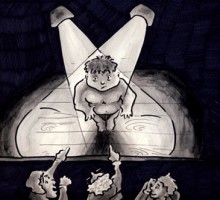Poetry and fantasy novels. Jim Butcher and Dr. Seuss. Have they got anything in common–other than Tolkien’s rambling poems and songs (which, I admit, I still skip, despite reading ‘Lord of the Rings’ a dozen times)? I claim yes.
Full disclosure: This post is different than others I’ve written so far, in that I’m still figuring out my opinion on it. Not so much on the value of the technique, which I’m convinced has some value, but rather the trade off between the ‘value add’ and the ‘time spent’, which isn’t inconsiderable, and an important consideration for a commercial writer. But I’ve found this topic only marginally explored in my pile of Writing Craft books, so maybe my ramblings are of interest. And if I’m overlooking an authoritative source for this topic, please mention in the comments!
To bring it back to writing, this post is about ‘voice’. And the benefit that basic poetry skills can bring to it. If you haven’t yet recoiled in horror at the topic, from a horrible memory of an ancient English teacher with massive jowls and knuckles like a fifty-year-old boxer, let me backtrack. 🙂
First, about me. Growing up, I had two creative outlets: a love of art and a love of fantasy and science fiction novels. I read Anne McCaffrey, Orson Scott Card, and David Eddings, along with many lesser known names. And I spent hours in my parent’s basement, drawing and coloring the type of images you see on the site. Some kind of dark. I’m sure my parents were thrilled. 🙂
When I was older, and looking to get back into the arts, it occurred to me that I could combine my interest in writing and art in the field of picture books. So I joined SCBWI and started writing and illustrating (NOT the same dark style, don’t worry). It was fun, and I learned a lot. And even got an occasional sniff of agent and editor interest. But the picture book market was tough (still is) and my writing skills were still budding. Eventually, I got restless and shifted to longer fantasy novels, my first reading love and the genesis of this site.
Hang with me; I’ve got a point, I promise. 🙂
In my picture book journey, I went through a period where I wanted to develop my skill at rhyming stories. So I joined an online poetry group, which included some published poets, and put some effort into it. At one SCBWI event, an agent read an anonymous sample of mine (in a ‘first pages’ session) and announced that “the author obviously had a lot of talent”. I also had a humorous poem published on a reputable poetry site. Not to toot my own horn here, I just want to establish that I have a grounding in rhyme and meter.
Fast forward to a year or so ago, when I finished my first draft of Black Diamonds, a story written much quicker than my two previous books. I’d embraced the idea of an outline and some world and character building before I typed the first sentence, encouraged by the quality of writing that one of my critique partners produced in her first draft, using the same type of approach. Another critique partner noted that she thought some of the line-level writing could be improved, based on the first draft.
At the same time, I happened to read David Coe’s mention on Magical Words about how he reads his words aloud–I think David has exceptional sentence and scene-level technique–as well as a few tangential mentions from other authors. So I decided to give it a try. And when I did?
I realized that it was exactly what I had been doing for my rhyming stories. Spoken out loud, I could hear the meter, the BEATS of emphasis that gave the words rhythm and music. And I could smooth it out, make it sound more pleasing, more musical.
The drawback? It took FOREVER. Doing poetry level polishing on language takes a long time. I estimated that it took me roughly an hour a page, and there were days it was much slower. The first draft took me maybe four months. The sentence level edit took me about eight more.
Ouch. I mean, not all was to do with voice. But still.
The problem was, and still is, that the exercise undoubtedly improves my writing. Aside from improving the ‘musicality’ of the words, reading a story that slowly makes you realize when the meanings aren’t quite right. When a description or reference doesn’t tie into later chapters. It does a lot of things to make the story better.
But it doesn’t touch story. Plot. Character development. Or premise. The bones of the story. Polishing for sound is the most superficial of skills. I would recommend, if you do it all, to do it last, even after you send it to a developmental editor. It’s a final draft skill. And it still begs the question: is it worth the time invested?
I don’t know.
And that is the crux of it. I polished Black Diamonds (my current work in progress) this way, for 75% of the story. Then a good critique and major edit came around, and I changed a lot of those words. Did that time invested make any lasting change? Was the time spent worth it? I don’t know. And honestly, how would you even know? You can’t send out two different versions of a story to the same audience. How do you disentangle a reader’s liking of word-level polish from their view on the bones of a story? Ahh.
I should clarify a bit on why the time spent was so disproportionate. Another issue with this type of edit? You’re reading it out loud. While I let the utter obviousness of that statement wash over you, 🙂 let me clarify. I can’t do it riding on the train (or at least don’t want to). I can’t do it in a coffee shop. I can’t do it in my backyard as people walk their dogs on the other side of the fence. This last winter, I would drive to a coffee shop, buy a coffee, and sit in the passenger seat of my car, window fogged up, so that no-one would look at me strangely as I muttered to myself. A couple of times, I forgot to turn off the headlights and drained the battery. CAA loved me. 🙂
But don’t take that slow timeline as set in stone. For one, I just discovered a partial solution to the obstacles above. Only last week, and it may be because of my own lack of tech savvy, I read an author’s post about how she used the Apple text to speech option* to hear her own words. That comment hit me like a smack of bricks to the forehead. I could make my laptop read to ME? Using HEADPHONES? ARGH!
And it works. Mostly. The tone is a bit flat, it doesn’t read things as naturally as you would yourself. But it also doesn’t get tired, distracted, or bored, ending up watching a squirrel nibble on an old muffin instead of actually working on the manuscript.
Did I mention: Argh! Oh well.
In any event, there you go. It’s worth thinking about: Meter. Rhythm. Reading your words out loud. You’ll be surprised at the difference it makes. Of course, polish is nothing without solid story structure and the other writing skills that you need, most mentioned in this post. Reading out loud is not a first draft tool, but a last draft one.
But if you want to improve your voice. If you have a solid story and sentence level problems are holding you back, it might be worth a try.
Your big-jowled English teacher be damned**. 🙂
____________________________________________
A book that I found a helpful resource is The Ode Less Traveled. Even better were SCBWI’s discussion boards—or at least they were a few years ago when I frequented them, as they had real poets willing to guide you in the basics, although I can’t weigh in on whether that’s still the case…
*If you have a Mac laptop like me, it’s the Speech and Diction option in Preferences, and has a default Option Esc key combo to make it work, once you’ve selected the text you want it to read.
** My apologies to English teachers everywhere. I’m just kidding, of course. My English teacher was a lovely lady and actually spurred me on to writing, with her encouragement and enthusiasm. I still remember and appreciate it.
Other random thoughts:
- Shakespeare had a great command of plot and scene. But isn’t it interesting that one of the most enduring writers of history wrote in a structured and proven meter pattern (iambic pentameter)?
- The first time that this concept was even partially introduced to me was in a writing craft book–I believe Bird by Bird, although I could be wrong–where the concept of ending a sentence with a hard beat was discussed, to add power and emphasis. I was rocked by the thought that a successful author cared about the SOUND of the word and not just its meaning.
The image for this post is actually not a finished one, but rather a few snapshots of the current piece that I am working on. I thought it looked kind of cool to show the progression, rough to more finished, and I didn’t have it completely done for today. Instead of waiting for the final piece, I thought I would include the roughs instead. It’ll save me rushing and potentially ruining the artwork through haste, or holding up the post until it’s done. I will probably post the final piece later, unless it takes a turn for the worse…




